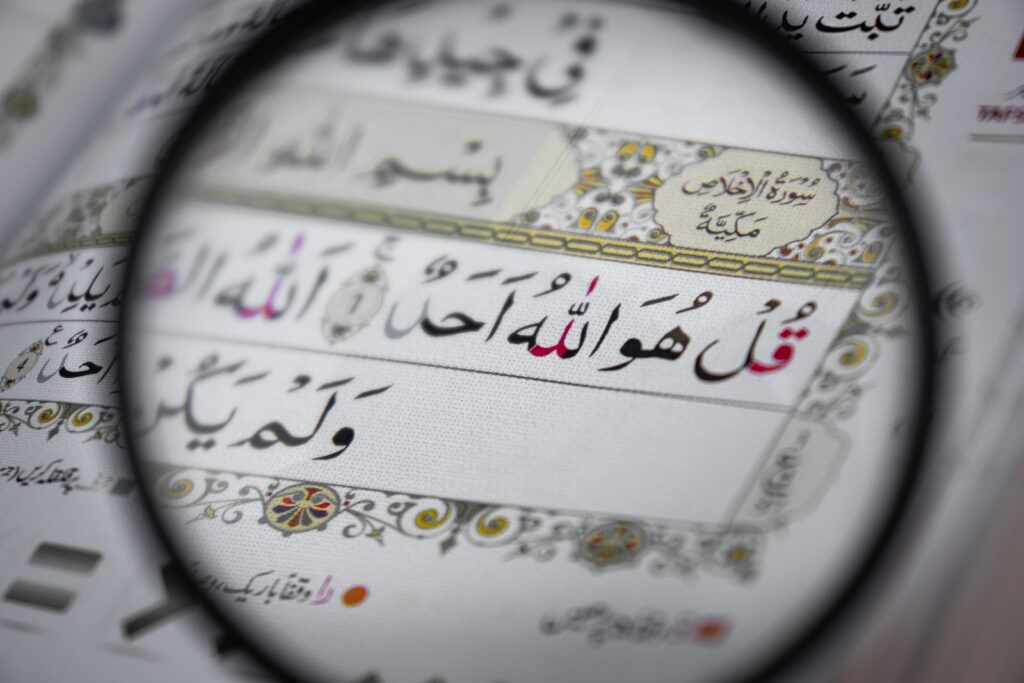Challenges facing Abu Bakr
The Caliph Abu Bakr, upon assuming leadership of the ummah, faced a number of important challenges. The most serious was the wars of apostasy against the non payers of zakat, the hypocrites and the false prophets. The brunt of the battles were borne by many of the prominent Companions. During the battle of Yamaamah, Abu Hudayfah inspired and encouraged the Companions by saying: “O possessors of the Qur’an, decorate the Qur’an with deeds”. The Companions also encouraged one another by saying: “O companions of Surah al-Baqarah” (Ya as-haab suratul al Baqarah).
The martyrs of Yamaamah
In the battle of Yamaamah, 70 companions who had memorised the Qur’an were killed. The death of such a large number of qurra’a alarmed Umar. He went to Abu Bakr, expressing his fear that more qurra’a may be killed in subsequent battles. This may lead to a loss of the Qur’an, unless it was complied in one book. Initially Abu Bakr was reluctant to do something that the Prophet (sallahu alaihi wa sallam) had not done. But Umar convinced him that collecting the Qur’an was of benefit to the Muslims. The Prophet arranged for the Qur’an to be written in order to preserve it. By compiling it in one book was completing what the Prophet (sallahu alaihi wa sallam) had already started.

Zayd ibn Thaabit chosen to compile the Qur’an
Zayd ibn Thaabit was chosen to compile the Qur’an for the following reasons:
- he was one of the best recitors of the Qur’an, and had the most knowledge with regards to the recitation of the Qur’an.
- he had memorised the Qur’an
- he was a primary scribe of the Prophet
- he witnessed Jibraeel’s final recitation to the Prophet in Ramadan
- he was youthful and had a sharp memory
- he was of good morals
Zayd’s methodology of verification
Zayd was instructed: ‘Sit at the entrance of the masjid. If anyone brings you a verse of the Book of Allah, along with two witnesses, write it down’. (Ibn Abi Dawood). Ibn Hajar explained that for written material to be accepted by Zayd, two witnesses had to swear that it had been written in the presence of the Prophet (sallahu alaihi wa sallam). Any written material that the Companions may have privately copied from another Companion was not accepted. Zayd’s knowledge of the Qur’an (through memorisation and writing) could only be compared with material of the same standing.
Zayd also compared the written material presented to him against the memories of the Companions. ‘So I gathered the Qur’an from various parchments and pieces of bone, and the chests of men”. He then mentions that ‘I found the last two ayahs of Surah al-Bara’a with Abu Khuzaima al Ansari’ (Bukhari). These two ayat were written in the mushuf solely based on Abu Khuzaima al Ansari’s written form. However, other companions had memorised it and testified that it was from the Qur’an. Even though Zayd and his fellow companions had memorised the last two ayahs of Surah al-Bara’a, and could recall them perfectly, he was not authorised to record it in the mushuf, until he came across it in written form. This fact is in contrast to the conjecture of Noldelke who stated that Zayd collected the revelation “chiefly from the breasts of men”.
The outcome of Abu Bakr’s compilation
Thus by relying on written material, backed by witnesses, comparing the written material against the memories of other Companions, and his own memory, Zayd ensured that the Mus-huf that he compiled was indeed the same Book that Allah had revealed to His Messenger, and had promised to preserve. For this first time, the entire Qur’an was in one Book. This compilation accommodated the various dialects of the Arabs. After the death of Abu Bakr, the Mus-huf was passed on to Umar, then to Hafsah after the death of Umar.

